Problems Related to Memory and Thinking
VerifiedAdded on 2022/08/22
|9
|1948
|18
AI Summary
Contribute Materials
Your contribution can guide someone’s learning journey. Share your
documents today.
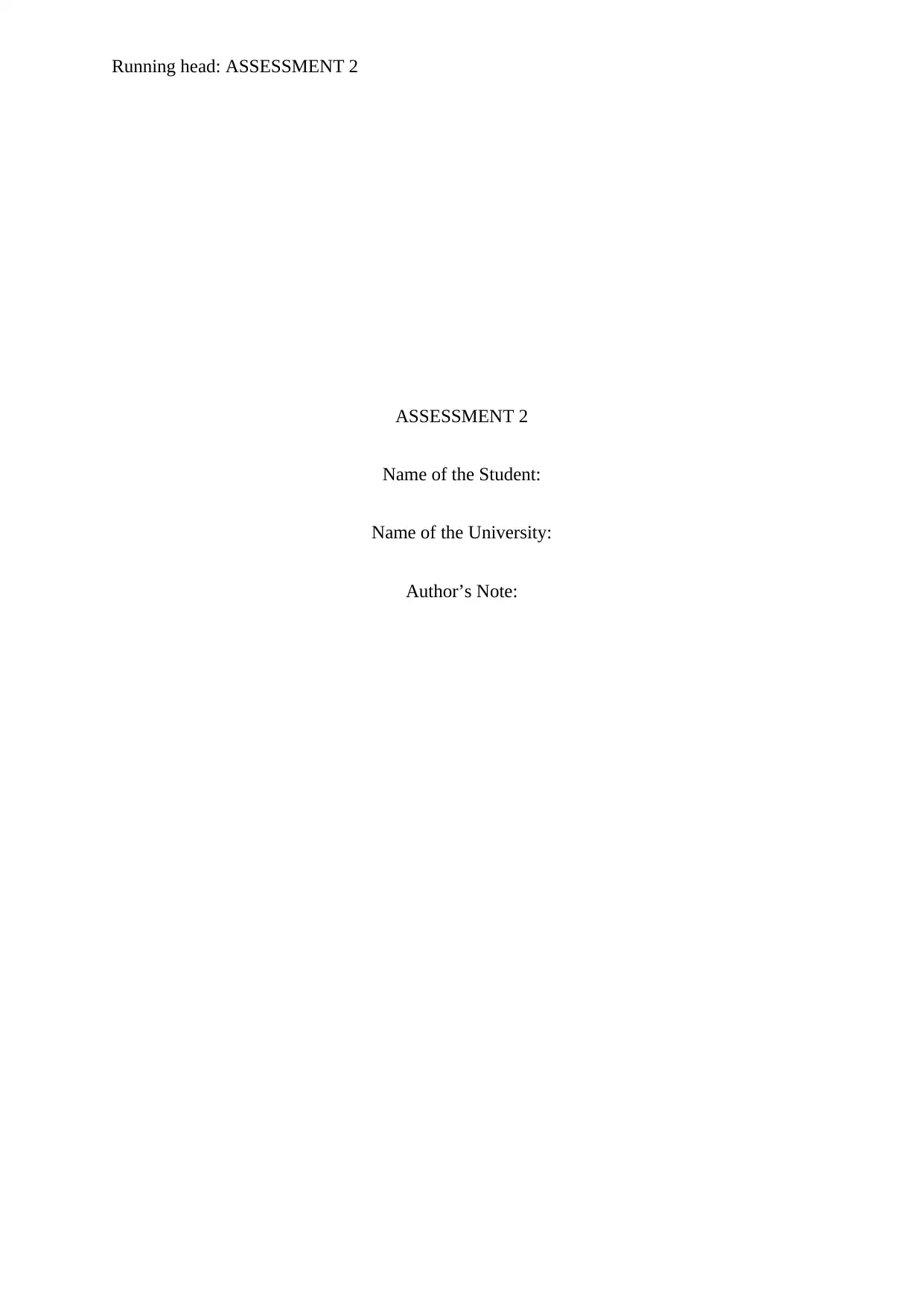
Running head: ASSESSMENT 2
ASSESSMENT 2
Name of the Student:
Name of the University:
Author’s Note:
ASSESSMENT 2
Name of the Student:
Name of the University:
Author’s Note:
Secure Best Marks with AI Grader
Need help grading? Try our AI Grader for instant feedback on your assignments.
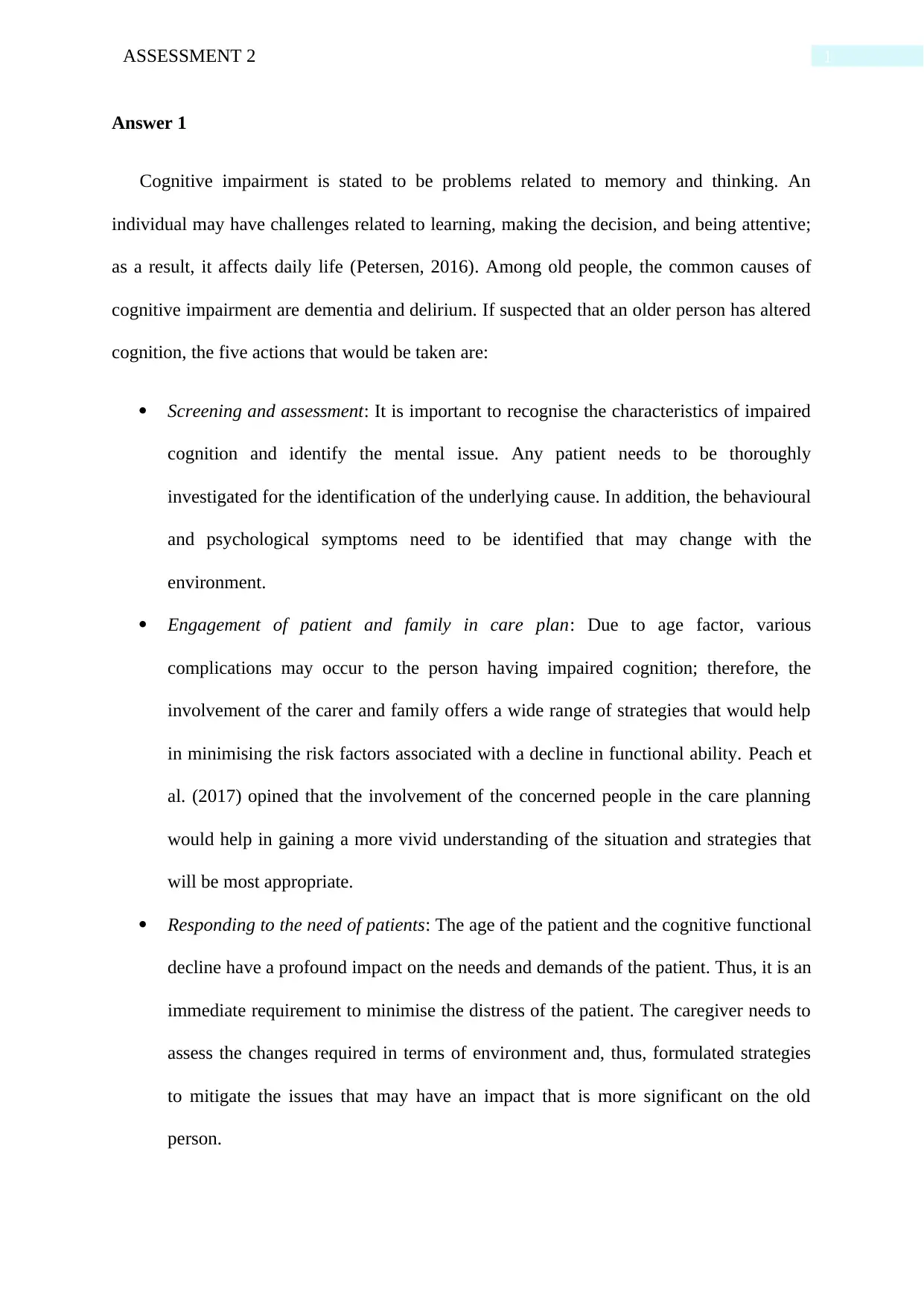
1ASSESSMENT 2
Answer 1
Cognitive impairment is stated to be problems related to memory and thinking. An
individual may have challenges related to learning, making the decision, and being attentive;
as a result, it affects daily life (Petersen, 2016). Among old people, the common causes of
cognitive impairment are dementia and delirium. If suspected that an older person has altered
cognition, the five actions that would be taken are:
Screening and assessment: It is important to recognise the characteristics of impaired
cognition and identify the mental issue. Any patient needs to be thoroughly
investigated for the identification of the underlying cause. In addition, the behavioural
and psychological symptoms need to be identified that may change with the
environment.
Engagement of patient and family in care plan: Due to age factor, various
complications may occur to the person having impaired cognition; therefore, the
involvement of the carer and family offers a wide range of strategies that would help
in minimising the risk factors associated with a decline in functional ability. Peach et
al. (2017) opined that the involvement of the concerned people in the care planning
would help in gaining a more vivid understanding of the situation and strategies that
will be most appropriate.
Responding to the need of patients: The age of the patient and the cognitive functional
decline have a profound impact on the needs and demands of the patient. Thus, it is an
immediate requirement to minimise the distress of the patient. The caregiver needs to
assess the changes required in terms of environment and, thus, formulated strategies
to mitigate the issues that may have an impact that is more significant on the old
person.
Answer 1
Cognitive impairment is stated to be problems related to memory and thinking. An
individual may have challenges related to learning, making the decision, and being attentive;
as a result, it affects daily life (Petersen, 2016). Among old people, the common causes of
cognitive impairment are dementia and delirium. If suspected that an older person has altered
cognition, the five actions that would be taken are:
Screening and assessment: It is important to recognise the characteristics of impaired
cognition and identify the mental issue. Any patient needs to be thoroughly
investigated for the identification of the underlying cause. In addition, the behavioural
and psychological symptoms need to be identified that may change with the
environment.
Engagement of patient and family in care plan: Due to age factor, various
complications may occur to the person having impaired cognition; therefore, the
involvement of the carer and family offers a wide range of strategies that would help
in minimising the risk factors associated with a decline in functional ability. Peach et
al. (2017) opined that the involvement of the concerned people in the care planning
would help in gaining a more vivid understanding of the situation and strategies that
will be most appropriate.
Responding to the need of patients: The age of the patient and the cognitive functional
decline have a profound impact on the needs and demands of the patient. Thus, it is an
immediate requirement to minimise the distress of the patient. The caregiver needs to
assess the changes required in terms of environment and, thus, formulated strategies
to mitigate the issues that may have an impact that is more significant on the old
person.
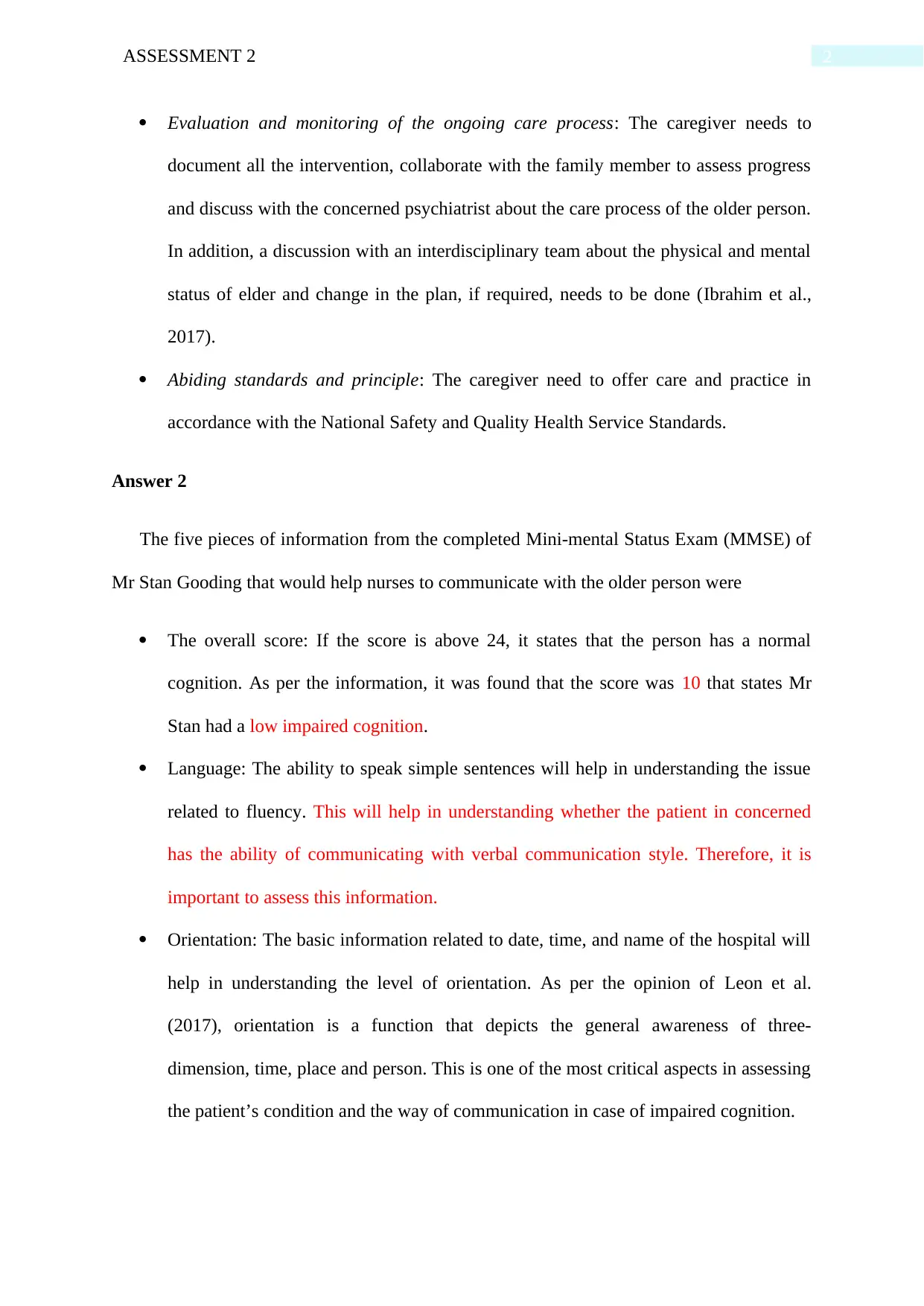
2ASSESSMENT 2
Evaluation and monitoring of the ongoing care process: The caregiver needs to
document all the intervention, collaborate with the family member to assess progress
and discuss with the concerned psychiatrist about the care process of the older person.
In addition, a discussion with an interdisciplinary team about the physical and mental
status of elder and change in the plan, if required, needs to be done (Ibrahim et al.,
2017).
Abiding standards and principle: The caregiver need to offer care and practice in
accordance with the National Safety and Quality Health Service Standards.
Answer 2
The five pieces of information from the completed Mini-mental Status Exam (MMSE) of
Mr Stan Gooding that would help nurses to communicate with the older person were
The overall score: If the score is above 24, it states that the person has a normal
cognition. As per the information, it was found that the score was 10 that states Mr
Stan had a low impaired cognition.
Language: The ability to speak simple sentences will help in understanding the issue
related to fluency. This will help in understanding whether the patient in concerned
has the ability of communicating with verbal communication style. Therefore, it is
important to assess this information.
Orientation: The basic information related to date, time, and name of the hospital will
help in understanding the level of orientation. As per the opinion of Leon et al.
(2017), orientation is a function that depicts the general awareness of three-
dimension, time, place and person. This is one of the most critical aspects in assessing
the patient’s condition and the way of communication in case of impaired cognition.
Evaluation and monitoring of the ongoing care process: The caregiver needs to
document all the intervention, collaborate with the family member to assess progress
and discuss with the concerned psychiatrist about the care process of the older person.
In addition, a discussion with an interdisciplinary team about the physical and mental
status of elder and change in the plan, if required, needs to be done (Ibrahim et al.,
2017).
Abiding standards and principle: The caregiver need to offer care and practice in
accordance with the National Safety and Quality Health Service Standards.
Answer 2
The five pieces of information from the completed Mini-mental Status Exam (MMSE) of
Mr Stan Gooding that would help nurses to communicate with the older person were
The overall score: If the score is above 24, it states that the person has a normal
cognition. As per the information, it was found that the score was 10 that states Mr
Stan had a low impaired cognition.
Language: The ability to speak simple sentences will help in understanding the issue
related to fluency. This will help in understanding whether the patient in concerned
has the ability of communicating with verbal communication style. Therefore, it is
important to assess this information.
Orientation: The basic information related to date, time, and name of the hospital will
help in understanding the level of orientation. As per the opinion of Leon et al.
(2017), orientation is a function that depicts the general awareness of three-
dimension, time, place and person. This is one of the most critical aspects in assessing
the patient’s condition and the way of communication in case of impaired cognition.
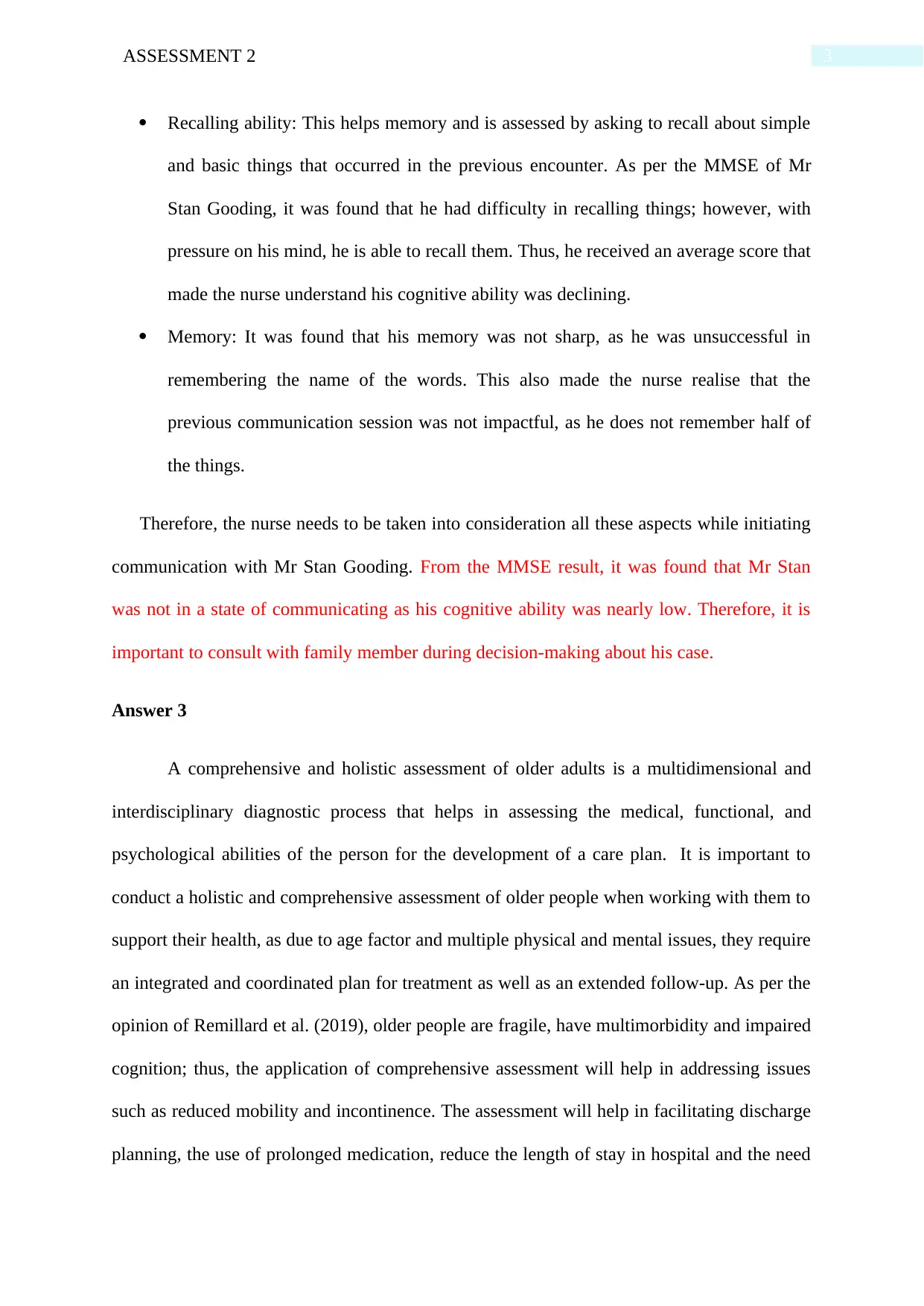
3ASSESSMENT 2
Recalling ability: This helps memory and is assessed by asking to recall about simple
and basic things that occurred in the previous encounter. As per the MMSE of Mr
Stan Gooding, it was found that he had difficulty in recalling things; however, with
pressure on his mind, he is able to recall them. Thus, he received an average score that
made the nurse understand his cognitive ability was declining.
Memory: It was found that his memory was not sharp, as he was unsuccessful in
remembering the name of the words. This also made the nurse realise that the
previous communication session was not impactful, as he does not remember half of
the things.
Therefore, the nurse needs to be taken into consideration all these aspects while initiating
communication with Mr Stan Gooding. From the MMSE result, it was found that Mr Stan
was not in a state of communicating as his cognitive ability was nearly low. Therefore, it is
important to consult with family member during decision-making about his case.
Answer 3
A comprehensive and holistic assessment of older adults is a multidimensional and
interdisciplinary diagnostic process that helps in assessing the medical, functional, and
psychological abilities of the person for the development of a care plan. It is important to
conduct a holistic and comprehensive assessment of older people when working with them to
support their health, as due to age factor and multiple physical and mental issues, they require
an integrated and coordinated plan for treatment as well as an extended follow-up. As per the
opinion of Remillard et al. (2019), older people are fragile, have multimorbidity and impaired
cognition; thus, the application of comprehensive assessment will help in addressing issues
such as reduced mobility and incontinence. The assessment will help in facilitating discharge
planning, the use of prolonged medication, reduce the length of stay in hospital and the need
Recalling ability: This helps memory and is assessed by asking to recall about simple
and basic things that occurred in the previous encounter. As per the MMSE of Mr
Stan Gooding, it was found that he had difficulty in recalling things; however, with
pressure on his mind, he is able to recall them. Thus, he received an average score that
made the nurse understand his cognitive ability was declining.
Memory: It was found that his memory was not sharp, as he was unsuccessful in
remembering the name of the words. This also made the nurse realise that the
previous communication session was not impactful, as he does not remember half of
the things.
Therefore, the nurse needs to be taken into consideration all these aspects while initiating
communication with Mr Stan Gooding. From the MMSE result, it was found that Mr Stan
was not in a state of communicating as his cognitive ability was nearly low. Therefore, it is
important to consult with family member during decision-making about his case.
Answer 3
A comprehensive and holistic assessment of older adults is a multidimensional and
interdisciplinary diagnostic process that helps in assessing the medical, functional, and
psychological abilities of the person for the development of a care plan. It is important to
conduct a holistic and comprehensive assessment of older people when working with them to
support their health, as due to age factor and multiple physical and mental issues, they require
an integrated and coordinated plan for treatment as well as an extended follow-up. As per the
opinion of Remillard et al. (2019), older people are fragile, have multimorbidity and impaired
cognition; thus, the application of comprehensive assessment will help in addressing issues
such as reduced mobility and incontinence. The assessment will help in facilitating discharge
planning, the use of prolonged medication, reduce the length of stay in hospital and the need
Secure Best Marks with AI Grader
Need help grading? Try our AI Grader for instant feedback on your assignments.
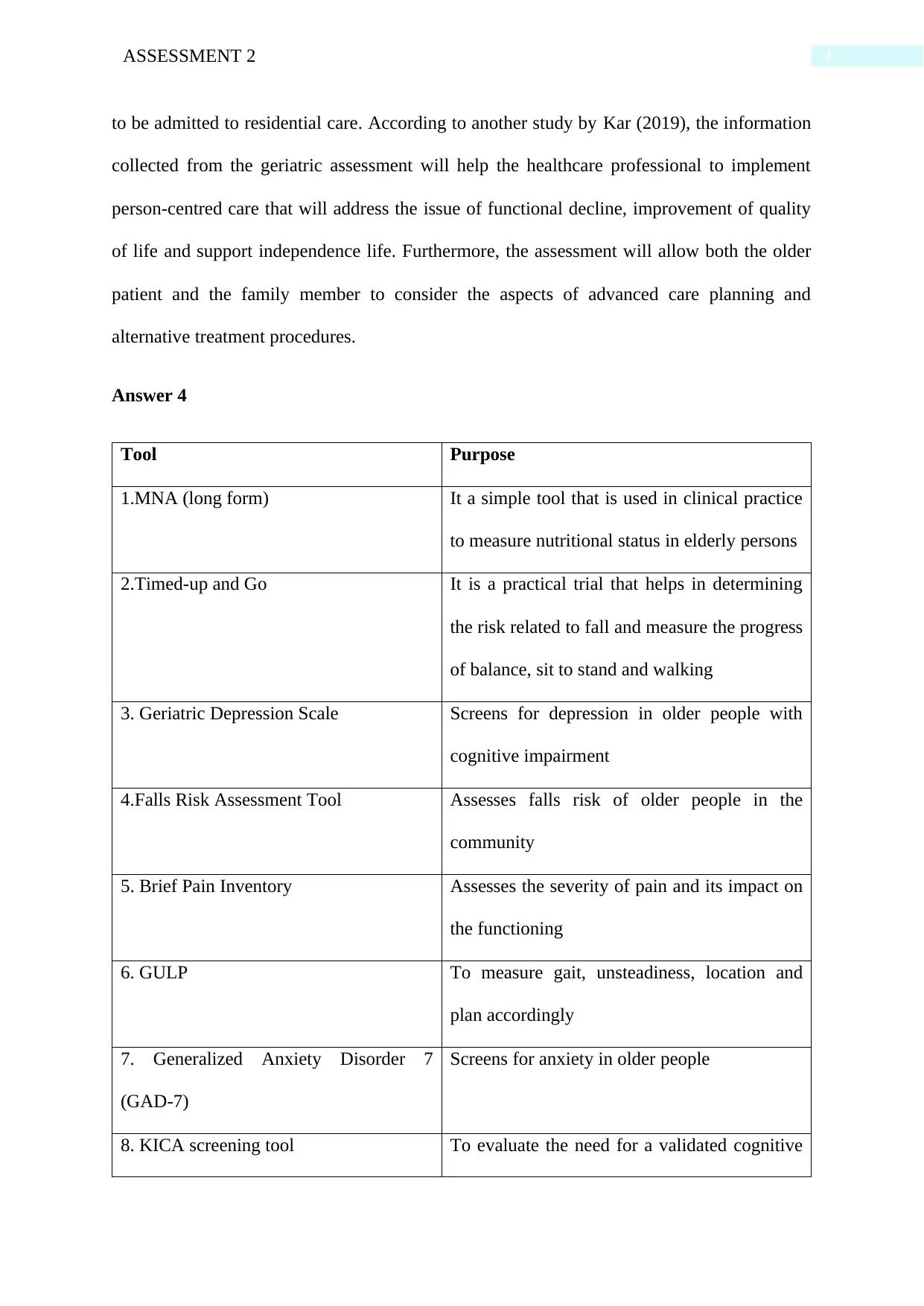
4ASSESSMENT 2
to be admitted to residential care. According to another study by Kar (2019), the information
collected from the geriatric assessment will help the healthcare professional to implement
person-centred care that will address the issue of functional decline, improvement of quality
of life and support independence life. Furthermore, the assessment will allow both the older
patient and the family member to consider the aspects of advanced care planning and
alternative treatment procedures.
Answer 4
Tool Purpose
1.MNA (long form) It a simple tool that is used in clinical practice
to measure nutritional status in elderly persons
2.Timed-up and Go It is a practical trial that helps in determining
the risk related to fall and measure the progress
of balance, sit to stand and walking
3. Geriatric Depression Scale Screens for depression in older people with
cognitive impairment
4.Falls Risk Assessment Tool Assesses falls risk of older people in the
community
5. Brief Pain Inventory Assesses the severity of pain and its impact on
the functioning
6. GULP To measure gait, unsteadiness, location and
plan accordingly
7. Generalized Anxiety Disorder 7
(GAD-7)
Screens for anxiety in older people
8. KICA screening tool To evaluate the need for a validated cognitive
to be admitted to residential care. According to another study by Kar (2019), the information
collected from the geriatric assessment will help the healthcare professional to implement
person-centred care that will address the issue of functional decline, improvement of quality
of life and support independence life. Furthermore, the assessment will allow both the older
patient and the family member to consider the aspects of advanced care planning and
alternative treatment procedures.
Answer 4
Tool Purpose
1.MNA (long form) It a simple tool that is used in clinical practice
to measure nutritional status in elderly persons
2.Timed-up and Go It is a practical trial that helps in determining
the risk related to fall and measure the progress
of balance, sit to stand and walking
3. Geriatric Depression Scale Screens for depression in older people with
cognitive impairment
4.Falls Risk Assessment Tool Assesses falls risk of older people in the
community
5. Brief Pain Inventory Assesses the severity of pain and its impact on
the functioning
6. GULP To measure gait, unsteadiness, location and
plan accordingly
7. Generalized Anxiety Disorder 7
(GAD-7)
Screens for anxiety in older people
8. KICA screening tool To evaluate the need for a validated cognitive
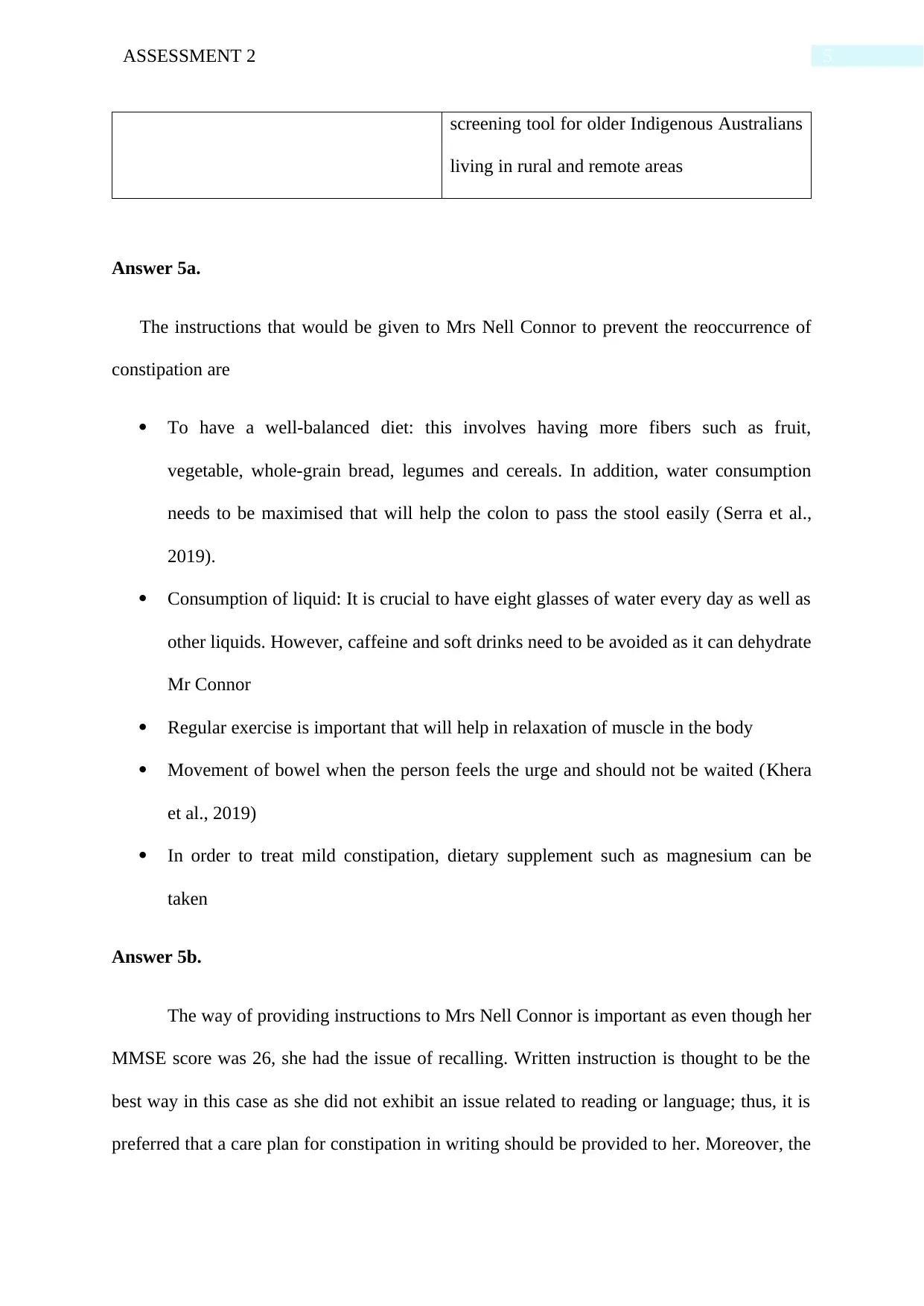
5ASSESSMENT 2
screening tool for older Indigenous Australians
living in rural and remote areas
Answer 5a.
The instructions that would be given to Mrs Nell Connor to prevent the reoccurrence of
constipation are
To have a well-balanced diet: this involves having more fibers such as fruit,
vegetable, whole-grain bread, legumes and cereals. In addition, water consumption
needs to be maximised that will help the colon to pass the stool easily (Serra et al.,
2019).
Consumption of liquid: It is crucial to have eight glasses of water every day as well as
other liquids. However, caffeine and soft drinks need to be avoided as it can dehydrate
Mr Connor
Regular exercise is important that will help in relaxation of muscle in the body
Movement of bowel when the person feels the urge and should not be waited (Khera
et al., 2019)
In order to treat mild constipation, dietary supplement such as magnesium can be
taken
Answer 5b.
The way of providing instructions to Mrs Nell Connor is important as even though her
MMSE score was 26, she had the issue of recalling. Written instruction is thought to be the
best way in this case as she did not exhibit an issue related to reading or language; thus, it is
preferred that a care plan for constipation in writing should be provided to her. Moreover, the
screening tool for older Indigenous Australians
living in rural and remote areas
Answer 5a.
The instructions that would be given to Mrs Nell Connor to prevent the reoccurrence of
constipation are
To have a well-balanced diet: this involves having more fibers such as fruit,
vegetable, whole-grain bread, legumes and cereals. In addition, water consumption
needs to be maximised that will help the colon to pass the stool easily (Serra et al.,
2019).
Consumption of liquid: It is crucial to have eight glasses of water every day as well as
other liquids. However, caffeine and soft drinks need to be avoided as it can dehydrate
Mr Connor
Regular exercise is important that will help in relaxation of muscle in the body
Movement of bowel when the person feels the urge and should not be waited (Khera
et al., 2019)
In order to treat mild constipation, dietary supplement such as magnesium can be
taken
Answer 5b.
The way of providing instructions to Mrs Nell Connor is important as even though her
MMSE score was 26, she had the issue of recalling. Written instruction is thought to be the
best way in this case as she did not exhibit an issue related to reading or language; thus, it is
preferred that a care plan for constipation in writing should be provided to her. Moreover, the

6ASSESSMENT 2
engagement of a family member can be suited, as he or she will help her remember the time
of consulting to the care plan; as a result, Mrs Connor will not be able to forget to follow the
plan.
engagement of a family member can be suited, as he or she will help her remember the time
of consulting to the care plan; as a result, Mrs Connor will not be able to forget to follow the
plan.
Paraphrase This Document
Need a fresh take? Get an instant paraphrase of this document with our AI Paraphraser
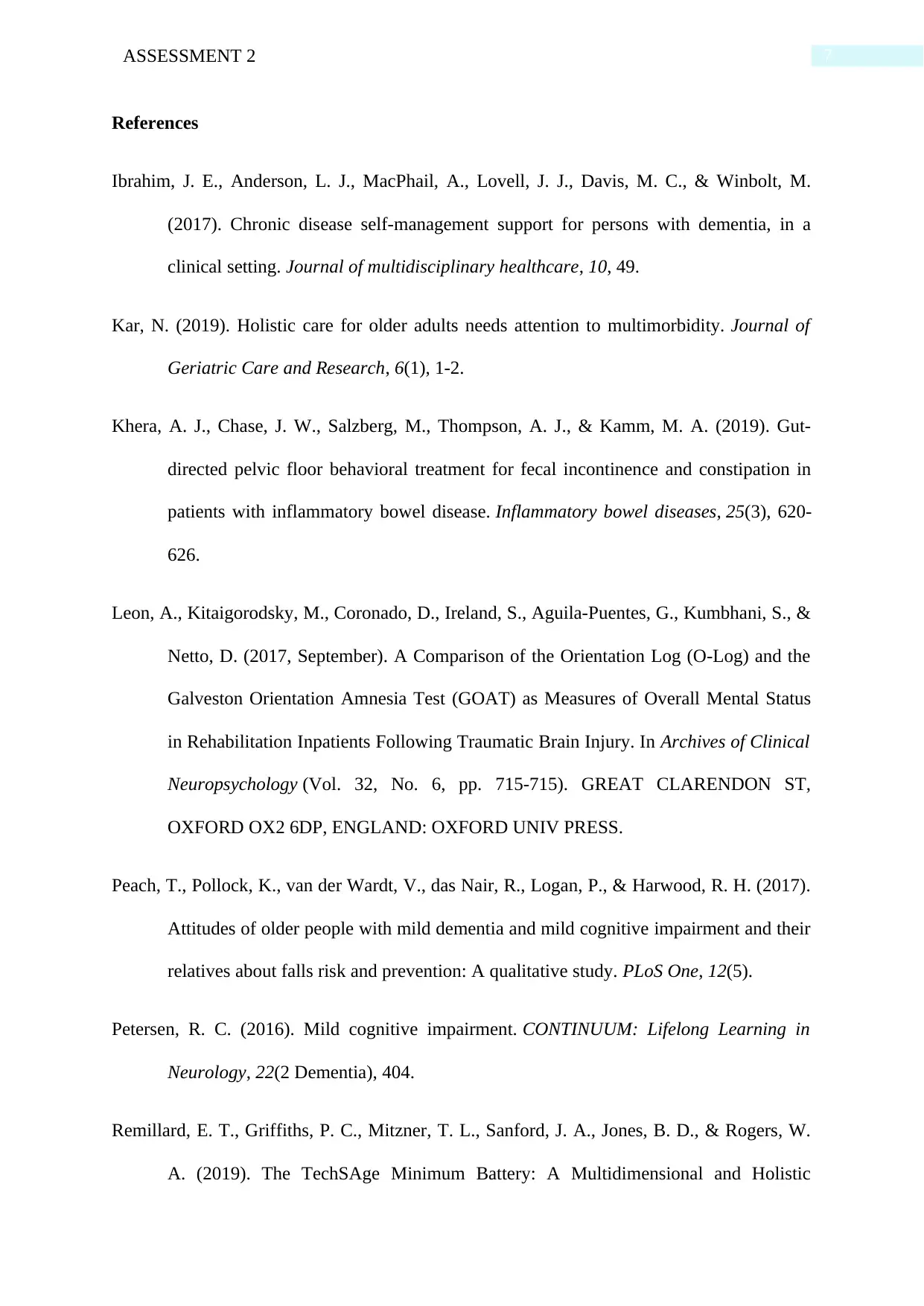
7ASSESSMENT 2
References
Ibrahim, J. E., Anderson, L. J., MacPhail, A., Lovell, J. J., Davis, M. C., & Winbolt, M.
(2017). Chronic disease self-management support for persons with dementia, in a
clinical setting. Journal of multidisciplinary healthcare, 10, 49.
Kar, N. (2019). Holistic care for older adults needs attention to multimorbidity. Journal of
Geriatric Care and Research, 6(1), 1-2.
Khera, A. J., Chase, J. W., Salzberg, M., Thompson, A. J., & Kamm, M. A. (2019). Gut-
directed pelvic floor behavioral treatment for fecal incontinence and constipation in
patients with inflammatory bowel disease. Inflammatory bowel diseases, 25(3), 620-
626.
Leon, A., Kitaigorodsky, M., Coronado, D., Ireland, S., Aguila-Puentes, G., Kumbhani, S., &
Netto, D. (2017, September). A Comparison of the Orientation Log (O-Log) and the
Galveston Orientation Amnesia Test (GOAT) as Measures of Overall Mental Status
in Rehabilitation Inpatients Following Traumatic Brain Injury. In Archives of Clinical
Neuropsychology (Vol. 32, No. 6, pp. 715-715). GREAT CLARENDON ST,
OXFORD OX2 6DP, ENGLAND: OXFORD UNIV PRESS.
Peach, T., Pollock, K., van der Wardt, V., das Nair, R., Logan, P., & Harwood, R. H. (2017).
Attitudes of older people with mild dementia and mild cognitive impairment and their
relatives about falls risk and prevention: A qualitative study. PLoS One, 12(5).
Petersen, R. C. (2016). Mild cognitive impairment. CONTINUUM: Lifelong Learning in
Neurology, 22(2 Dementia), 404.
Remillard, E. T., Griffiths, P. C., Mitzner, T. L., Sanford, J. A., Jones, B. D., & Rogers, W.
A. (2019). The TechSAge Minimum Battery: A Multidimensional and Holistic
References
Ibrahim, J. E., Anderson, L. J., MacPhail, A., Lovell, J. J., Davis, M. C., & Winbolt, M.
(2017). Chronic disease self-management support for persons with dementia, in a
clinical setting. Journal of multidisciplinary healthcare, 10, 49.
Kar, N. (2019). Holistic care for older adults needs attention to multimorbidity. Journal of
Geriatric Care and Research, 6(1), 1-2.
Khera, A. J., Chase, J. W., Salzberg, M., Thompson, A. J., & Kamm, M. A. (2019). Gut-
directed pelvic floor behavioral treatment for fecal incontinence and constipation in
patients with inflammatory bowel disease. Inflammatory bowel diseases, 25(3), 620-
626.
Leon, A., Kitaigorodsky, M., Coronado, D., Ireland, S., Aguila-Puentes, G., Kumbhani, S., &
Netto, D. (2017, September). A Comparison of the Orientation Log (O-Log) and the
Galveston Orientation Amnesia Test (GOAT) as Measures of Overall Mental Status
in Rehabilitation Inpatients Following Traumatic Brain Injury. In Archives of Clinical
Neuropsychology (Vol. 32, No. 6, pp. 715-715). GREAT CLARENDON ST,
OXFORD OX2 6DP, ENGLAND: OXFORD UNIV PRESS.
Peach, T., Pollock, K., van der Wardt, V., das Nair, R., Logan, P., & Harwood, R. H. (2017).
Attitudes of older people with mild dementia and mild cognitive impairment and their
relatives about falls risk and prevention: A qualitative study. PLoS One, 12(5).
Petersen, R. C. (2016). Mild cognitive impairment. CONTINUUM: Lifelong Learning in
Neurology, 22(2 Dementia), 404.
Remillard, E. T., Griffiths, P. C., Mitzner, T. L., Sanford, J. A., Jones, B. D., & Rogers, W.
A. (2019). The TechSAge Minimum Battery: A Multidimensional and Holistic
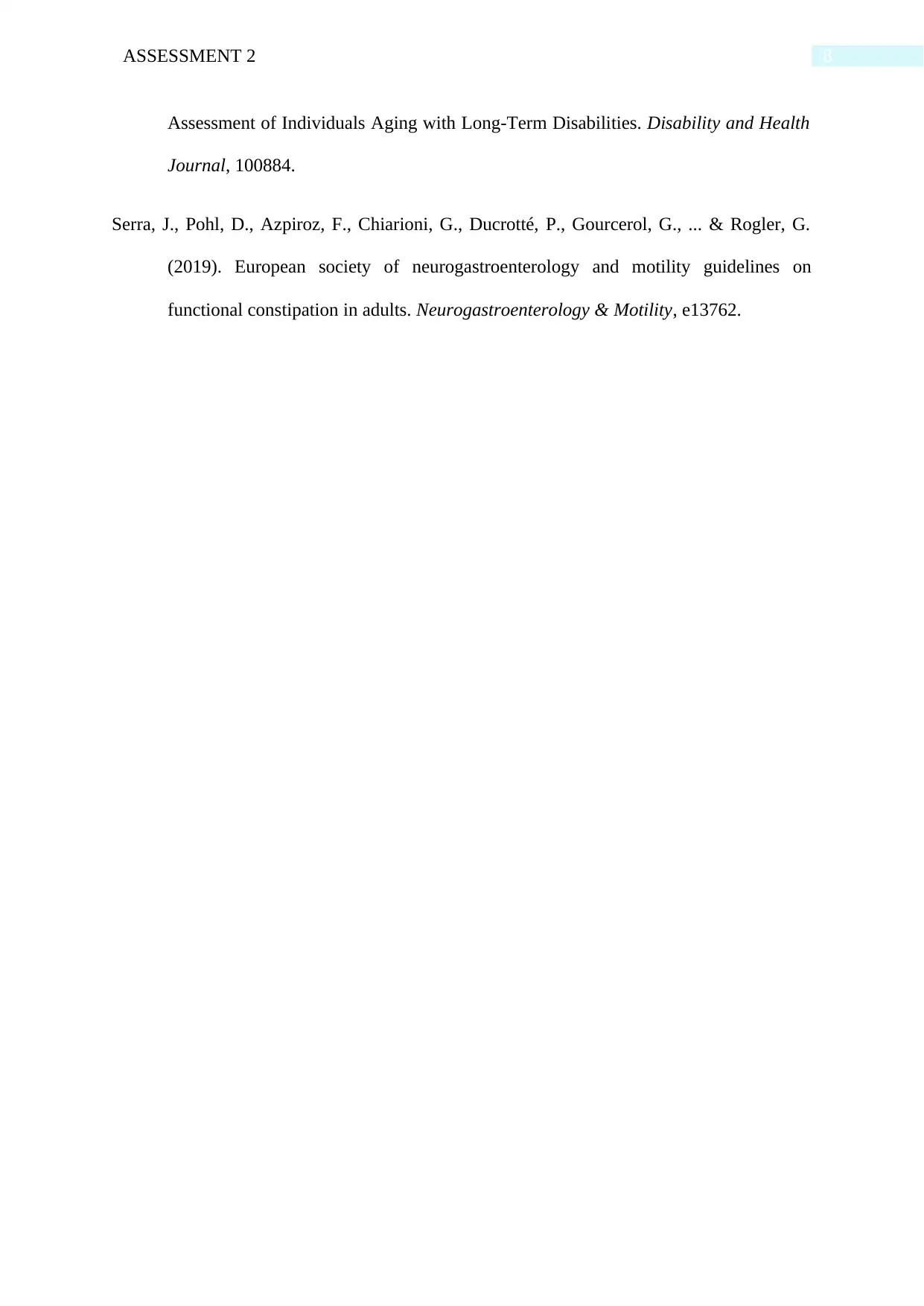
8ASSESSMENT 2
Assessment of Individuals Aging with Long-Term Disabilities. Disability and Health
Journal, 100884.
Serra, J., Pohl, D., Azpiroz, F., Chiarioni, G., Ducrotté, P., Gourcerol, G., ... & Rogler, G.
(2019). European society of neurogastroenterology and motility guidelines on
functional constipation in adults. Neurogastroenterology & Motility, e13762.
Assessment of Individuals Aging with Long-Term Disabilities. Disability and Health
Journal, 100884.
Serra, J., Pohl, D., Azpiroz, F., Chiarioni, G., Ducrotté, P., Gourcerol, G., ... & Rogler, G.
(2019). European society of neurogastroenterology and motility guidelines on
functional constipation in adults. Neurogastroenterology & Motility, e13762.
1 out of 9
Related Documents
Your All-in-One AI-Powered Toolkit for Academic Success.
+13062052269
info@desklib.com
Available 24*7 on WhatsApp / Email
![[object Object]](/_next/static/media/star-bottom.7253800d.svg)
Unlock your academic potential
© 2024 | Zucol Services PVT LTD | All rights reserved.





